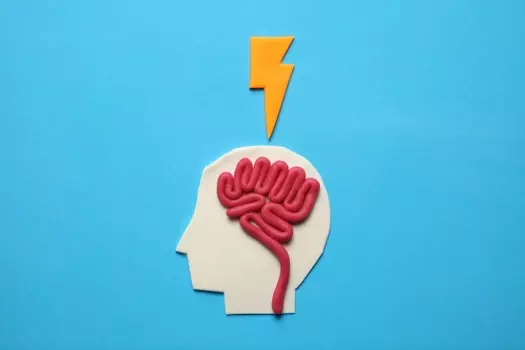Detecting unwanted intrusive thoughts
David A. Clark is one of the best respected names in the field of CBT, with more than thirty years of experience. In this edited excerpt from Controlling Your Mind he offers practical advice on how to identify problematic intrusive thoughts.
The Unsettled Mind
Think back to the last time you were bored. Maybe you were stuck in traffic, mindlessly watching a TV programme, or trapped in a tedious meeting at work. Can you remember what you were thinking? Probably not, but it’s very likely you were daydreaming or your mind was wandering from one thought to the next. When bored, we are especially prone to intrusive thinking. Our mind switches into an automatic mode which generates free-floating thoughts that are entirely disconnected from each other and may have little relevance to our current situation. It’s like our mind is always in an active, unsettled state, even when we feel understimulated. Of course, there are other times when our free-floating, or intrusive, thoughts take on a darker, more negative tone because they’re triggered by a stressful or problematic situation. Our memory for this type of thinking is sharper because these thoughts focus on issues more important to our general wellbeing.
Hunting for Intrusions
Any thought, image, or memory can be an unwanted mental intrusion. Whether a thought is an unwanted intrusion depends on your evaluation of the thought. In fact, the actual thoughts we find unwanted and intrusive can be quite unique to each of us. So my mental intrusions will be quite different from yours, but everyone experiences unwanted negative intrusive thoughts, images or memories. Of course, the frequency and distressing quality of unwanted intrusions differs greatly from person to person. The first task, then, is to discover the mental intrusions at the heart of your own emotional distress and whether they are linked together by a common theme.
Becoming more aware of intrusive thinking is challenging because these thoughts often pop into the mind unexpectedly and then disappear before we know it. However the intrusions most relevant to personal distress are tightly connected to our emotions, and if you’re aware of how you feel, you can work back from the emotion to discover the intrusive thought that made you feel bad in the first place.
Mental Intrusions: An Aspect of Creativity
Cognitive neuroscientists tell us that around 50 per cent of our thinking is spontaneous, stimulus-independent thought such as daydreaming, mind-wandering, unwanted mental intrusions and the like. This type of thinking is so common that it’s actually been called the brain’s default mode of operation. Spontaneous intrusive thinking, then, is not only normal but also essential to how the human brain operates.
If you’ve been struggling with distressing intrusive thoughts, you might be wondering if there’s something wrong with you. Nothing could be further from the truth. Intrusive thinking, or what scientists call undirected thought, is important for human survival. Having frequent positive intrusive thoughts, for example, predicts resilience, growth and life satisfaction.
Spontaneous positive thinking also contributes to creativity, which is critical for language, music, art and the like. So, being an intrusive thinker is not a negative characteristic but rather a very positive and enriching mental process. The goal is not to stop intrusive thoughts, if that were even possible, but rather to harness your intrusions, that is, to learn how to dampen down the effects of unwanted distressing intrusions and boost the benefits of positive or inspirational spontaneous thought.
Is it possible you’ve been so focused on negative thoughts and feelings that you’ve failed to recognise the benefits of your positive spontaneous thoughts? Maybe intrusive thinking is playing a more adaptive role in your life than you realise. For example, how often has a solution to a problem suddenly come to you out of the blue? At times, you might actually call it ‘inspiration’. Our ability to think creatively, to generate solutions to problems, to come up with a good idea, is dependent on the part of our brain that engages in spontaneous unintended thought. So, if you are an intrusive thinker, congratulations! You have an amazing mental ability, but your challenge is to manage it wisely.
There is considerable similarity between positive intrusive thoughts and negative intrusive thoughts. Therefore, it’s quite possible to frequently experience both. Keep your creativity in mind, and remind yourself that your unwanted negative intrusive thoughts may be a product of your creative and imaginative mind.
The Ubiquity of Negative Intrusions
Unwanted and unpleasant mental intrusions are a fact of life for most people. You may be surprised to learn that even fairly disturbing intrusive thoughts, some of which you might consider to be disgusting, immoral or repugnant, are reported by the average person. For example, a study of hundreds of university students from thirteen countries found that over 80 per cent reported at least one unwanted, mildly distressing intrusive thought over a three-month period about contamination, doubt, harm or aggression, immoral sexual or religious concerns, or being a victim of violence. It is now a well-established finding that practically everyone has unwanted and distressing mental intrusions. What differs among us is the frequency of our negative intrusions, the degree to which we can control them and the intensity of our distress.
You may have assumed you’re alone in your struggle with unwanted and distressing thoughts and feelings. If you find it hard to believe that others experience the same type of negative thinking, select five or six close friends, family members, or your spouse or partner, and ask them about their unwanted thoughts, images or memories.
The existence of negative intrusive thoughts and feelings is not the issue: what matters is how you deal with it. Some people seem to be more aware of their intrusive thoughts than others.
Are You an Intrusive Thinker?
There are many reasons why some people have more frequent and distressing intrusive thoughts than others. First, our life experiences can affect intrusive thinking. Stressful or traumatic life experiences can cause us to have repeated unwanted intrusive memories of the trauma for months or even years after the event. Second, our mood state affects the type of unwanted thoughts that intrude into our mind. If you’re in a sad or depressed mood, you’ll have more frequent negative intrusions of loss and failure; if anxious, your unwanted intrusions will focus on threat and danger; and if angry, you’ll have more spontaneous thoughts about injustice and unfairness. Third, our personality affects whether we have few or many negative mental intrusions. People who are more emotional, more aware of their thoughts, and have greater difficulty controlling unwanted thinking, will experience more frequent and distressing mental intrusions.
Like millions of people, you may be struggling with negative emotional states like anxiety, depression, guilt, obsessions, anger, and the like. Alternatively, your negative emotions may tend to be milder and more sporadic. Regardless of where you lie on the personal-distress scale, the key to better mental health starts with your unsettled mind. How we think affects how we feel, so changing your thoughts can bring healing and wholeness to your troubled emotions.




